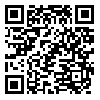BibTeX | RIS | EndNote | Medlars | ProCite | Reference Manager | RefWorks
Send citation to:
URL: http://tumj.tums.ac.ir/article-1-529-en.html
Background: Because of importance and extensive use of textile in clinical setting especially as bandage, so outbreak of nosocomial infections due to Bacteria resistance nanobiotechnological advances in recent decade, achieved methods for fabrication antimicrobial effect in fibers that can satisfied the needs of patients in the wake of health and hygiene.
Methods: The antimicrobial effect of special type of fibers produced in Isfahan Poly Acryl Plant on one resistant strain of Pseudomonas aeruginosa isolated from 54 wound samples of patients in Isabn e Maryam hospital and P.aeruginosa (PTCC1024) was studied by using shake flask method. In order to compare the effect of pure antimicrobial agent of the fiber with that of gentamicin, the minimal inhibitory concentration of these agents was tested on strains. The effect of the interaction of these two antimicrobial agents and their fractional inhibitory concentration on chosen strains was studied using checkerboard method.
Results: The results show inefficient effect by antimicrobial fiber on P.aeruginosa strains after 24 hrs. But despite the high level MIC of gentamicin on these bacteria (1-3 µg/ml), the MIC of pure antimicrobial agent of fiber at a level of 10-3 µl/ml caused growth inhibition. The interaction of these antibacterial agents on the P.aeruginosa isolated from wound was evaluated as synergism.
Conclusions: According to this study the antimicrobial effect of the fiber on growth inhibition of P.aeruginosa strains is negative (despite of significant effect by pure antimicrobial agent used in produced the antimicrobial fiber on examined strains).
| Rights and permissions | |
 |
This work is licensed under a Creative Commons Attribution-NonCommercial 4.0 International License. |





